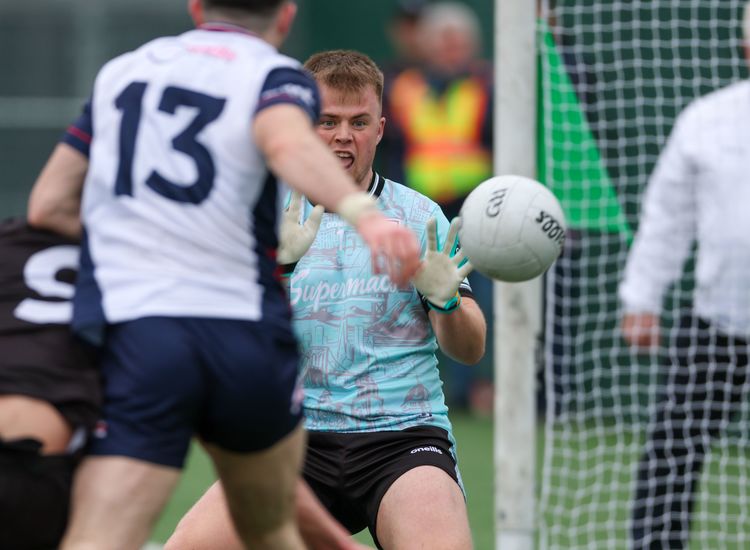By Ray O'Hanlon
Things happened fast around Darren Hanniffy when he was helping the Offaly hurling team capture the All Ireland title.
These days, Hanniffy's thoughts are focused less on the clash of the ash than on a part of the world that has been turned to rubble and ashes.
Hanniffy is "country director" in Haiti for the Irish aid agency GOAL. More accurately, perhaps, he is GOAL's director for the shattered remains of a country.
But that doesn't have to remain the case, argues Hanniffy, whose hurling career with his county reached its high point with the 1998 All Ireland winning team.
Hanniffy's non-sporting career background is in engineering and in recent years he has applied his skills working in the developing world for GOAL, in "short stints" as he put it.
GOAL's origins as an aid agency owe much to founder John O'Shea's connections to Irish sporting stars. O'Shea, a sports journalist, has long harnessed the names and drawing power of front rank Irish athletes to further his organization's many causes around the world. GOAL workers these days, however, come from varied backgrounds, not necessarily sporting.
Still, Hanniffy's athletic past works well on a number of levels, not least in the physical energy department. Field work for GOAL is not known for an excess of home comforts.
One of Hanniffy's GOAL stints took him last year to Honduras. GOAL has been working in the Central American nation for a number of years and in terms of challenges and working conditions, the Honduran operation counts as entry level. By GOAL standards, then, it's a soft posting.
"I was in Honduras to help kick start a project. There was a delay in finding my replacement so I decided to quit my job and become country director," Hanniffy explained in an interview at the Echo office in New York where he had stopped by on his way to Kennedy airport and a flight back to Haiti.
He was planning to wrap up the Honduras job by February and move on to something else. The move happened all right, though it came more quickly than planned and was caused by something neither he, nor anyone else, had expected.
The earthquake that devastated Haiti has etched January 12 into that nation's consciousness for all foreseeable time.
Hanniffy was in the Honduran capital of Tegucigalpa when news of the quake broke.
"I got a call from John O'Shea asking me to get to Haiti as quickly as possible," said Hanniffy.
By luck and happenstance, Hanniffy managed to get to Haiti far faster than a lot of other people rushing to aid the stricken population of the western hemisphere's poorest nation.
GOAL was helped in this by Digicell, the cell phone company owned by Irish businessman Denis O'Brien. A private jet was laid on for Hanniffy and he arrived in Port-au-Prince at 6 a.m. the morning after the quake.
Hanniffy had been in other parts of the world facing, to put it mildly, social and natural challenges. He was no stranger to dead bodies and shattered infrastructure.
But the Scale of the Haitian devastation knocked him backwards.
"The place was a wipeout," he said.
"I had seen bodies in rubble before but nothing like this. There were bodies everywhere in the streets. The sheer scale of it was overwhelming," he said.
"It was like the entire population of Cork had been killed."
Overwhelming or not, there was work to be done and it was Hanniffy's task to set up GOAL's relief operation. Initially, that was just himself.
For the first couple of nights he slept out in the open. After that he graduated to curling up in a vehicle. In time, he would secure the relatively luxurious accommodation provided by a tent.
GOAL was assigned the task of feeding the survivors in two of the city's 16 districts and in the first two months, acting for the World Food Program, an initial team of 15 GOAL volunteers fed half a million people.
More than four months after the earthquake, GOAL is meeting its targets with regard to food, shelter and "hygiene kits" - vital tools in preventing the always expected outbreak of disease.
"There is no serious disease at this stage," said Hanniffy.
That might change with the advent of the rainy and hurricane season in the coming days. With this in mind, Hanniffy and his colleagues are now focusing on the erection of what are dubbed "medium robust" shelters, thousands of them that are being paid for by the U.S. government's aid arm, USAID.
Beyond shelters, the work has included the setting up of temporary schools which, in time, will be replaced by permanent ones.
"We have also set up a second front out in the countryside where we are working to encourage families to help each other," Hanniffy said.
About 75 Goal workers, or "GOALies" as they call themselves, have worked in Haiti since the earthquake. The number at any one time has fluctuated. Right now there are about 25 and that will likely rise to a stabilized 30 in the next few weeks.
Looking ahead, Hanniffy stresses the importance of Haitian involvement in piecing back together both infrastructure and the nation's social cohesion.
"The future of Haiti includes tapping into its diaspora and getting its members involved in the recovery. It's also vital to restore incentive for those in Haiti. The brain drain from Haiti is a very serious issue," he said.
Hanniffy is committed to his Haiti post until at least July. He thinks he might extend his time, particularly given the challenges that the rainy season will present to GOAL's operation and operatives.
"The rains are just starting and the health system is in bits," he said.
Still, Hanniffy believes that GOAL's effort is beginning to turn things around, at least for those people in the areas that the agency's work is concentrated.
"This is probably our biggest program in the world right now," he said.
Hanniffy might be forgiven for feeling despair for Haiti and its people. After all, the story of Haiti has rarely strayed from the twin evils of poverty and political oppression.
But he is not alone in seeing opportunity amid the carnage. What has happened can't be changed, but what happens next can make things better than they were before January 12.
Hanniffy sees a better road ahead if overpopulated Port-au-Prince is reduced in size and more people in the rural areas are allowed to own their own land.
"The key is land use policy," he said.










